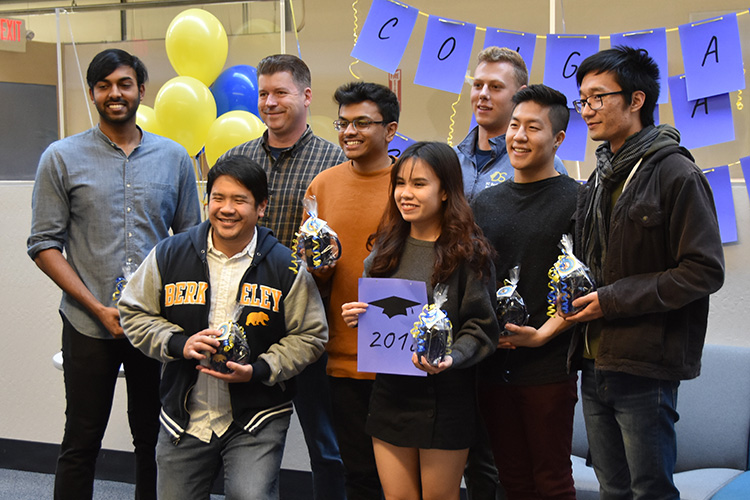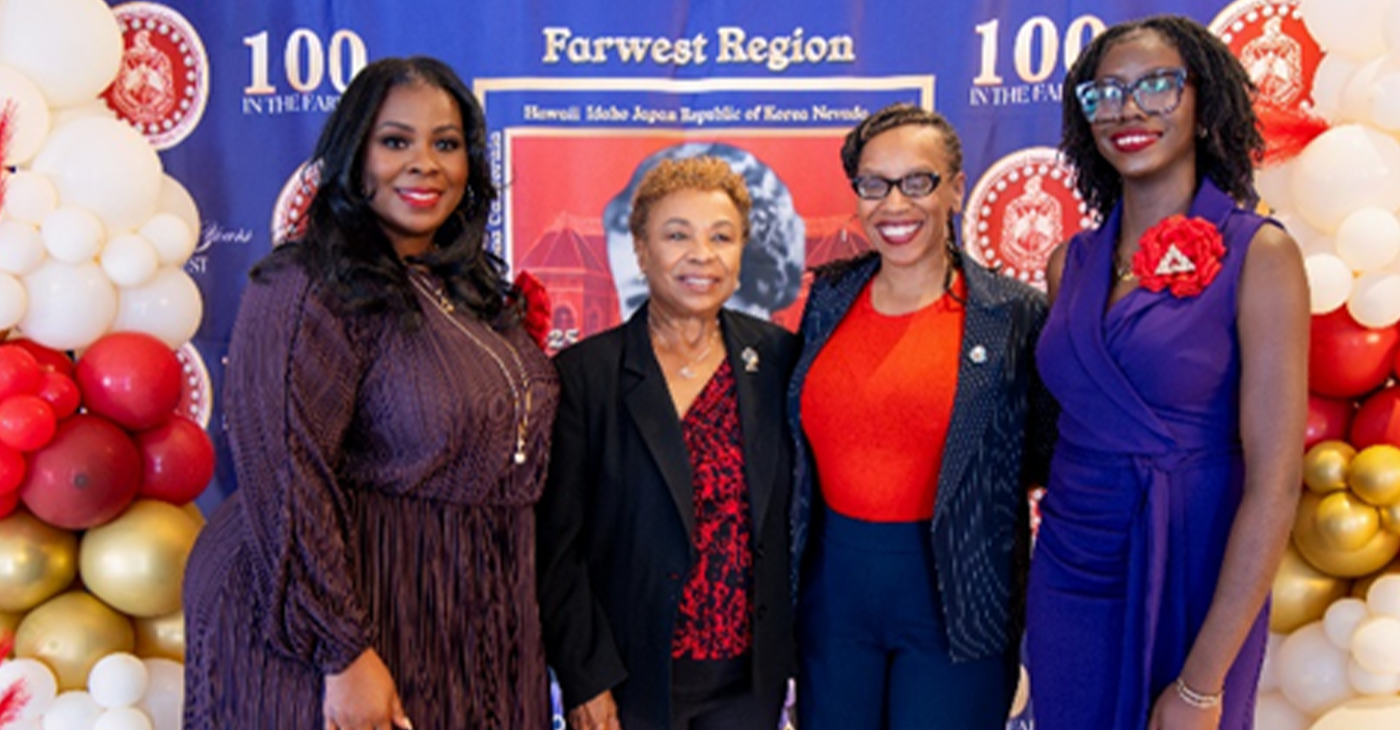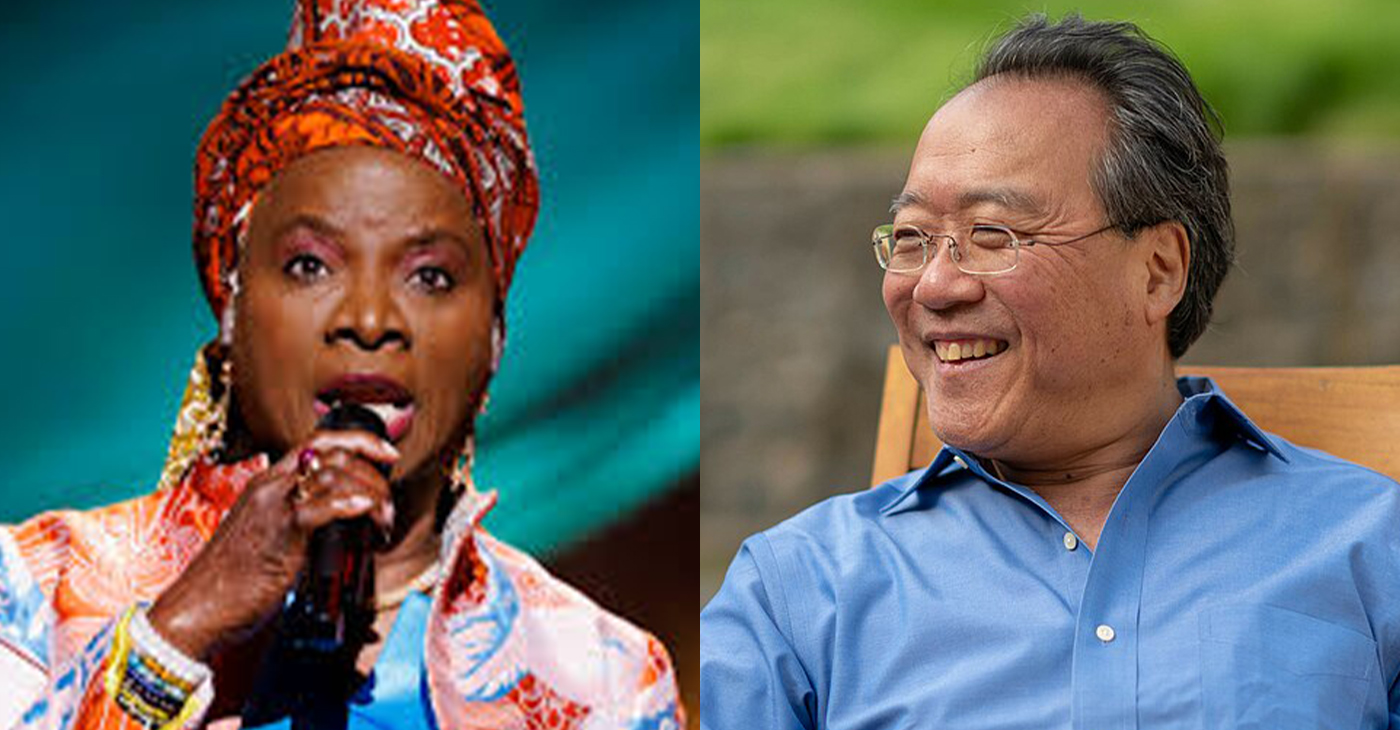Berkeley
UC Berkeley’s First Data Science Majors Celebrate Graduation


Eight of the nine data science majors who graduated December 15 gathered in the Division of Data Sciences on December 14 to celebrate their achievement. From left: Jeevan Reddy Mokkala, Emanuel Lucban, Adam Osborn, Nikhil Krishnan, Thao Vo,
Alexander Ivanoff, Liam Shi and Howe Cui. Not pictured: Ting Chih Lin. (UC Berkeley photo by Hulda Nelson).
Alexander Ivanoff couldn’t get enough data science.
After taking the introductory course Foundations of Data Science (Data 8) in the fall semester of his sophomore year, the UC Berkeley senior wanted to find out where else the numbers could take him. He also wanted to spread his new enthusiasm for data with other students, especially those who may not consider themselves “number people.”
He paired up with Vinitra Swamy and faculty member Niek Veldhuis to form one of the first data science “modules” — teams of students and faculty collaborating to build computational teaching tools for subjects ranging from history to cognitive neuroscience – and within months was creating a new platform for students to analyze ancient Sumerian texts in Veldhuis’s Cuneiform languages class.
One of the tools they developed was a language analysis software that could help pinpoint where different characters appeared in various texts, unveiling clues about what the Sumerians thought was important, which characters were related and what they did.
“Veldhuis took us to the anthropology museum and we got to literally hold ancient Sumerian clay tablets to connect on that next level with what they are doing,” Ivanoff said. “They showed me just how versatile data science tools were, which, combined with hearing about their capabilities in the news, made me really want to get involved more.”
On December 15, Ivanoff was one of nine students to graduate with a Bachelor of Arts in Data Science, the first set of degrees to be granted in this rapidly growing new major. Launched this fall, nearly 1,200 students have already filed pre-declarations for the major. Approximately 100 are expected to graduate with the degree this spring.
“The very first question on the very first day of the [pilot Data 8] class wasn’t ‘How are you going to grade the final,’ it was, ‘Will the data science major be ready in time for me to graduate?’” said David Culler, interim dean for data sciences, at an event to honor the majors on December `14.
A team was assembled over the summer to plan out the advising process for all the students, bringing together experience from across the campus. Hundreds of students got individual advising, which will allow them to navigate the expectations of the new major.
“I was originally a cognitive science and stats double major, and when they announced the data science major, I realized I could switch my do-it-yourself data science major to the actual data science major,” Ivanoff said.
The major is built upon a foundation of computer science, statistics and mathematics courses. But it doesn’t stop there. Each student is also required to specialize in a “domain,” which encourages them to apply their analytical skills to real-world problems. This year’s cohort graduates with domain emphases in cognition, computational biology methods, economics, robotics, social welfare, health and poverty, and applied mathematics and modeling.
Students say the wide breadth of applications of data science is one of the things they love about the field.
“Every time I have a new dataset I feel like I am learning something, and it makes me feel like I can always explore new things,” said Thao Vo, who chose applied math, modeling, and optimization as her emphasis.
And industry demand for tech-savvy graduates hasn’t hurt student enthusiam.
“I’m a big fan of the phrase ‘skate to where the puck is going,’” said Ivanoff, who will graduate with an emphasis in cognition. “To really be peak employable, I would want to get more technical skills under my belt, and it is great that they are already really applicable to the field that I wanted to study”
Student interest has propelled the creation of the major, said history professor Cathryn Carson, who leads the Data Science Education Program. In addition to building the module program, students have filled the first floor of Moffit Library with peer advisers and teaching consultants, and have created a host of student organizations that run workshops and industry events. They also have been essential in outreach, Carson said, helping attract new students to data science who might not feel welcome in technical fields.
“We knew that something real was going on in the outside world that the students were the signal of,” said Carson. “It took a lot of collaboration across the university, including the administration, and a lot of spurring by the students to put the major together.”
Emanuel Lucban, a non-traditional student who has more than a decade of experience in web design and I.T., also cel¬ebrated his graduation on December 15. He was inspired to go back to school after reading a 2012 New York Times article about how a statistical model developed by Target analyzed purchasing behavior to accurately predict that a woman was pregnant before her family knew – and, conveniently, sent her coupons for prenatal vita¬mins.
“The capacity to record data has increased over the past decade, and now we are finding all sorts of uses for data — things that I never would have imagined, and it was just interesting to me what kinds of things we could infer from data,” Lucban said.
Lucban took computer science classes at a local community college before transferring to UC Berkeley in 2016. Though he started as a com¬puter science major, Lucban jumped at the chance to get a degree in data science.
“I was really excited when I heard Iabout this new data science major opening up because that was my entire reason for going back to school — I eventually planned to leave here and then go to grad school for data science,” Lucban said.
“These students were motivated by their own desire to complete this major and their own sense that they could make it in the world,” Carson said. “They are a really special group.”
Arts and Culture
Farwest Region Deltas Celebrate Centennial With “September Breakfast” Honoring Vivian Osborne Marsh
The region was established in 1925 under the leadership of Vivian Osborne Marsh, who became its first Regional Director. Marsh was a pioneering scholar and civic leader, earning recognition as the first Black woman to receive both a bachelor’s and a master’s degree in anthropology from UC Berkeley.

By Antoinette Porter
Hundreds of members of Delta Sigma Theta Sorority, Inc., and their guests gathered at the Martin Luther King Jr. Student Union at the University of California, Berkeley, to mark the 100th anniversary of the sorority’s Farwest Region.
The region was established in 1925 under the leadership of Vivian Osborne Marsh, who became its first Regional Director. Marsh was a pioneering scholar and civic leader, earning recognition as the first Black woman to receive both a bachelor’s and a master’s degree in anthropology from UC Berkeley.
Marsh went on to serve as Delta Sigma Theta’s 7th National President, where she launched the sorority’s National Library Project to expand access to books in underserved Black communities in the South. During her presidency, the organization also became a prominent voice in the civil rights movement, lobbying Congress to pass anti-lynching legislation.
Bak in the Bay Area, Marsh devoted her career to advancing educational opportunities, mentoring young people, and strengthening community life. That commitment continues to shape the region, which supports initiatives in education, social justice, and economic development. Current projects include raising scholarship funds for students at Historically Black Colleges and Universities, voter education campaigns, and health and wellness programs.
A century after its founding, the Farwest Region of Delta Sigma Theta remains active across California and other western states, carrying forward Marsh’s vision of service and advocacy.
Arts and Culture
Cal Performances Presents Angélique Kidjo & Yo-Yo Ma in Sarabande Africaine at UC Berkeley Greek Theatre on Aug. 30
On Saturday, Aug. 30, the pair will debut the Bay Area premiere of Sarabande Africaine, joined by pianist Thierry Vaton, percussionist David Donatien, and special guest Sinkane. The program illuminates centuries of musical interplay between African traditions and Western classical forms, using the Baroque sarabande dance, and its African ancestor, the Congolese spirit dance Zarabanda, as a gateway to exploring the deep, interconnected roots of global music.

By Carla Thomas
On Labor Day weekend two of the world’s most celebrated musicians and cultural ambassadors, Grammy Award–winning vocalist Angélique Kidjo and legendary cellist Yo-Yo Ma join forces for an evening of music, history, and cultural dialogue at UC Berkeley’s historic Hearst Greek Theatre.
On Saturday, Aug. 30, the pair will debut the Bay Area premiere of Sarabande Africaine, joined by pianist Thierry Vaton, percussionist David Donatien, and special guest Sinkane. The program illuminates centuries of musical interplay between African traditions and Western classical forms, using the Baroque sarabande dance, and its African ancestor, the Congolese spirit dance Zarabanda, as a gateway to exploring the deep, interconnected roots of global music.
Both Kidjo and Ma have built careers not only as great performers but as passionate advocates for cultural understanding. Sarabande Africaine is as much a conversation about shared heritage as it is a musical performance, blending genres, geographies, and histories.
“Every day there are moments when all of us can feel we are on the inside of something and also when we feel we are on the outside of something,” said Yo-Yo Ma. “To be able to understand both at the same time and oscillate between the two gives us a larger perspective on the world.”
“If your mind is open, and there is no fear, it’s easier to listen, and to question yourself,” said Kidjo.
The upcoming performance is presented within Cal Performances’ Illuminations: “Exile & Sanctuary” series for the 2025–26 season. The production explores exile as more than just physical displacement, but a disruption in identity and belonging, while sanctuary represents both refuge and the creative space where new connections and communities can take shape.
Cal Performances’ Illuminations bridges performances with UC Berkeley’s academic research, pairing the arts with conversations about urgent global issues.
Kidjo’s continued partnership with Cal Performances includes her 2021–22 artist-in-residence, premiering her music-theater work Yemandja, set in 19th-century West Africa during the transatlantic slave trade.
She also participated in the Bias in Our Algorithms and Society panel alongside campus leaders like Jennifer Chayes, and joined the Black Studies Collaboratory for a dialogue on music, diaspora, and the world.
She has since returned to Berkeley for multiple performances, most recently in 2024 at Zellerbach Hall.
Yo-Yo Ma’s history with Cal Performances spans decades, beginning in 1997. One notable project includes the 2018 performance of Bach’s complete cello suites at the Greek Theatre, a testament to his devotion to creating “transformative concert experiences in iconic spaces.”
For tickets and more information, visit calperformances.org.
Activism
The Case Against Probate: False Ruling Invalidates Black Professor’s Estate Plan, Ignoring 28-Year Relationship
Zakiya Folami Jendayi, beneficiary of Head’s estate, states that “The errors, ranging from misstatements of fact, omissions of critical evidence, and reliance on false arguments and testimony, formed the basis of Judge Sandra K. Bean’s ruling against me, Dr. Head’s previous student, mentee, sorority sister and long-time friend,and despite the fact that I was her chosen, power of attorney, Advanced Healthcare Directive agent, trustee, executor and sole beneficiary.”

By Tanya Dennis
Part 5
In a shocking miscarriage of justice, a California probate judge issued a Statement of Decision on March 28 riddled with numerous documented errors that invalidated the estate plan of esteemed Black Studies professor Dr. Laura Dean Head.
The ruling from the Alameda County Superior Court’s probate division in Berkeley has sparked outrage from advocates for probate reform, community members and civil rights activists, who say the decision reflects deep flaws in the probate system, blatant disregard for due process, and the wishes of the ancestors. Judge Sandra Bean’s ruling reflects a repeated outcome seen in Black and Brown communities.
Zakiya Folami Jendayi, beneficiary of Head’s estate, states that “The errors, ranging from misstatements of fact, omissions of critical evidence, and reliance on false arguments and testimony, formed the basis of Judge Sandra K. Bean’s ruling against me, Dr. Head’s previous student, mentee, sorority sister and long-time friend,and despite the fact that I was her chosen, power of attorney, Advanced Healthcare Directive agent, trustee, executor and sole beneficiary.”
Reading court transcripts, the most egregious violations according to Jendayi reveal a pivotal point in the ruling that rested on a letter from Dr. Stephan Sarafian of Kaiser Permanente, who misidentified Dr. Head as male, misstated the day, month, and year, and asserted Head lacked capacity.
Under cross-examination, he reversed his opinion and admitted under oath that he never conducted a mental evaluation, did not diagnose Dr. Head with incapacity, did not write the letter, and stated he merely signed it “in case it was needed in the future.”
Despite Sarafian’s perjury, on Oct. 17, 2024, the California Court of Appeal upheld the lower court decision that relied on Sarafian’s discredited letter to invalidate Dr. Head’s estate plan, ignored Jendayi’s requests to impeach his testimony and dismiss Sarafian’s testimony and letter that both the Kaiser Grievance Department and the Medical Board of California denounced.
In her ruling, Judge Bean agreed with the false argument by attorney Leahy, which alleged that Jendayi provided the names of the beneficiaries to Head’s estate attorney, Elaine Lee. Bean made this decision despite Lee’s sworn testimony that Dr. Head had met with her alone, behind closed doors, and made the independent decision to leave her estate to Jendayi.
According to court records, Judge Bean reversed the burden of proof in the undue influence claim before any of Jendayi’s witnesses testified, forcing Jendayi to disprove allegations that were never substantiated by witnesses or records.
Bean ruled: “Respondent took Dr. Head to her apartment where she assumed complete control of Dr. Head’s day-to-day care, medical care, and all aspects of her life.” Jendayi proved that statement was false.
Bean also ruled that Respondent controlled Dr. Head’s necessities of life, food, and hospice care, despite zero testimony or documentation supporting any of those claims.
The court reduced Jendayi’s role to “a friend who, at best, cared for Dr. Head during the final two months,” totally ignoring 28 years of friendship, testimony, evidence, letters of recommendation, emails, and medical records.
Exhibits confirming Dr. Head’s intent and capacity, including the discredited medical letter, Exhibit 90, were omitted or misrepresented in the judge’s final decision.
Jendayi says, “The injustice within the probate justice system is devastating, traumatizing and financially depleting. It’s nothing short of legalized crime!”
Jendayi is now appealing to the Supreme Court of the U.S. with a petition citing denial of due process, judicial misconduct, and systemic bias in probate courts.
-

 Activism4 weeks ago
Activism4 weeks agoIN MEMORIAM: William ‘Bill’ Patterson, 94
-

 Activism4 weeks ago
Activism4 weeks agoOakland Post: Week of November 19 – 25, 2025
-

 #NNPA BlackPress3 weeks ago
#NNPA BlackPress3 weeks agoLIHEAP Funds Released After Weeks of Delay as States and the District Rush to Protect Households from the Cold
-

 #NNPA BlackPress4 weeks ago
#NNPA BlackPress4 weeks agoBeyoncé and Jay-Z make rare public appearance with Lewis Hamilton at Las Vegas Grand Prix
-

 Alameda County2 weeks ago
Alameda County2 weeks agoSeth Curry Makes Impressive Debut with the Golden State Warriors
-

 Activism3 weeks ago
Activism3 weeks agoOakland Post: Week of November 26 – December 2, 2025
-

 #NNPA BlackPress4 weeks ago
#NNPA BlackPress4 weeks agoLewis Hamilton set to start LAST in Saturday Night’s Las Vegas Grand Prix
-

 #NNPA BlackPress3 weeks ago
#NNPA BlackPress3 weeks agoSeven Steps to Help Your Child Build Meaningful Connections







































